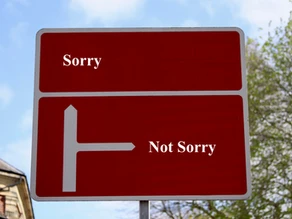As Brits, we are well known for being over-apologetic and saying sorry all the time, and I am certainly no exception. As someone who likes to be liked (yes, it took me a while to accept that this is OK too), I am always trying to make other people feel at ease – which sometimes means I apologise for their mistakes
Have you ever found yourself saying “I’m sorry” when someone bumps into you? Why should we apologise for this? Perhaps, it is out of politeness, being kind and respectful, or trying to make the other person feel better. It seems, for me, that apologising has become a habit, a part of my personality that chips away at my confidence, making me feel guilty.
I attended ICB’s International Women’s Day with the fabulous Simone Gilbert who suggested that we stop saying sorry and say thank you instead. It never really occurred to me until then how much I said I was sorry or how being sorry all the time was making me feel.
So, I started giving it a go.
“I’m sorry to bother you when I know you are so busy” was replaced with “Thank you for taking the time when I know you are so busy.”
and
“I’m sorry, but I am unable to attend the meeting” was replaced with “Thank you for inviting me to attend the meeting, although I am unable to attend.”
I immediately noticed a positive and empowering change with how I was feeling. I felt confident, in control, and I was valuing my worth. I also noticed that the recipient of my thanks responded in a much more positive, engaging and friendly manner too.
It is worth taking a moment to see how we feel when someone apologises to us rather than saying thank you – how does it make you feel?
Now then, I am not saying we should never apologise – sometimes ‘I’m sorry is just what needs to be said. Let us give these two little words some meaning and only use them when no other words will do!
Lots of good luck with grabbing back your power balance.
Kerry xx
Can you think of any other instances where ‘I’m sorry’ can be replaced?

